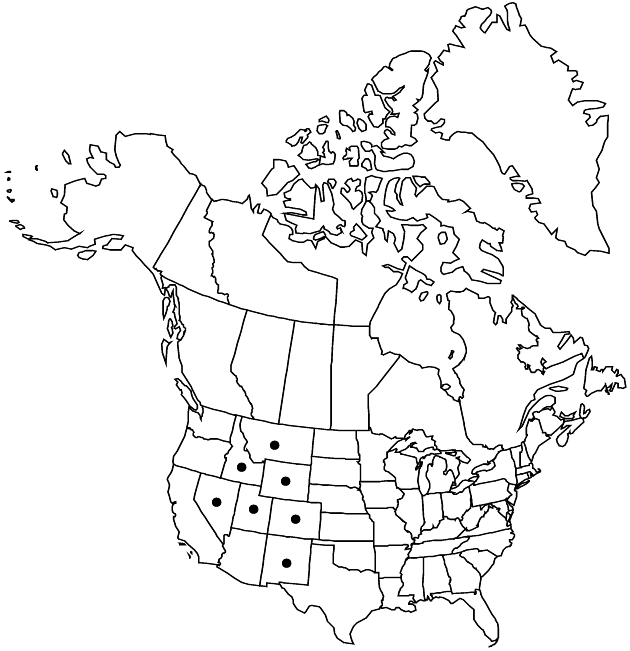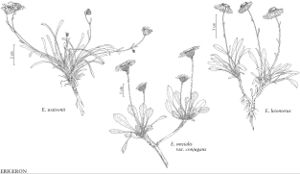Difference between revisions of "Erigeron leiomerus"
in A. Gray et al., Syn. Fl. N. Amer. 1(2): 211. 1884.
FNA>Volume Importer |
imported>Volume Importer |
||
| (5 intermediate revisions by 2 users not shown) | |||
| Line 1: | Line 1: | ||
{{Treatment/ID | {{Treatment/ID | ||
|accepted_name=Erigeron leiomerus | |accepted_name=Erigeron leiomerus | ||
| − | |accepted_authority=A. Gray | + | |accepted_authority=A. Gray |
|publications={{Treatment/Publication | |publications={{Treatment/Publication | ||
|title=in A. Gray et al., Syn. Fl. N. Amer. | |title=in A. Gray et al., Syn. Fl. N. Amer. | ||
| Line 8: | Line 8: | ||
}} | }} | ||
|common_names=Rockslide fleabane | |common_names=Rockslide fleabane | ||
| + | |special_status={{Treatment/ID/Special_status | ||
| + | |code=F | ||
| + | |label=Illustrated | ||
| + | }}{{Treatment/ID/Special_status | ||
| + | |code=E | ||
| + | |label=Endemic | ||
| + | }} | ||
|basionyms= | |basionyms= | ||
|synonyms= | |synonyms= | ||
| Line 32: | Line 39: | ||
-->{{#Taxon: | -->{{#Taxon: | ||
name=Erigeron leiomerus | name=Erigeron leiomerus | ||
| − | + | |authority=A. Gray | |
| − | |authority=A. Gray | ||
|rank=species | |rank=species | ||
|parent rank=genus | |parent rank=genus | ||
| Line 46: | Line 52: | ||
|publication title=in A. Gray et al., Syn. Fl. N. Amer. | |publication title=in A. Gray et al., Syn. Fl. N. Amer. | ||
|publication year=1884 | |publication year=1884 | ||
| − | |special status= | + | |special status=Illustrated;Endemic |
| − | |source xml=https:// | + | |source xml=https://bitbucket.org/aafc-mbb/fna-data-curation/src/2e0870ddd59836b60bcf96646a41e87ea5a5943a/coarse_grained_fna_xml/V19-20-21/V20_668.xml |
|tribe=Asteraceae tribe Astereae | |tribe=Asteraceae tribe Astereae | ||
|genus=Erigeron | |genus=Erigeron | ||
Latest revision as of 20:04, 5 November 2020
Perennials, 4–12(–15) cm; taprooted (taproots often not evident or not collected), caudices with diffuse system of relatively long and slender, rhizomelike branches. Stems decumbent to ascending or erect (usually purplish proximally, sometimes greenish), glabrous or sparsely strigillose (hairs closely to loosely appressed), eglandular. Leaves basal and cauline; basal blades oblanceolate to obovate or spatulate, 15–70 × 2–11(–15) mm, cauline reduced distally (bases of basal sometimes purplish, enlarged; of cauline, not subclasping), margins entire, faces glabrous or sparsely strigose, eglandular. Heads 1. Involucres 4–6 × 7–13 mm. Phyllaries in 2–3 series (often purplish, narrowly elliptic, erect, apices appressed), glabrous or sparsely strigose, minutely glandular. Ray florets 15–60; corollas white to blue or purple, 6–11 mm, laminae reflexing. Disc corollas 3.2–4.4 mm. Cypselae 2–2.2 mm, 2-nerved, faces sparsely strigose; pappi: outer of setae, inner of 15–25 bristles. 2n = 18.
Phenology: Flowering Jun–Sep.
Habitat: Talus slopes, boulder fields, and other rocky or gravelly habitats, meadows, spruce, lodgepole pine, alpine tundra
Elevation: 2600–3800 m
Distribution

Colo., Idaho, Mont., Nev., N.Mex., Utah, Wyo.
Discussion
Selected References
None.
